The German language is as precise as German engineering. It has its own set of grammar rules and is supposed to be pronounced in a specific way. Learning it is very important for anyone intending to study, work, or travel in Europe, as it is a commonly understood language in the region.
Fortunately, there are a plethora of options to master it. I have personally used German learning apps and can now participate in fluent conversations. It is based on my experience using these platforms that I have created this list.
The apps listed here shall help you get the accent and pronunciation right. These shall help you hold a proper conversation for all your needs. Be it as a traveler, as a student, or as a business person, you will be able to communicate effectively.
So, are you ready?
Top 10 Apps for Learning German
I have rejected many apps and not placed them here because they don’t provide a complete understanding of the language.
I have also tried and only picked ones that have a good User Interface. These not only help you learn German but also keep testing your language skills from time to time to jog your memory.
I have taken a three-pronged approach here. All apps teach you to speak, but most of these here will also cover the basics like the alphabet.
1. Best of All: Babbel
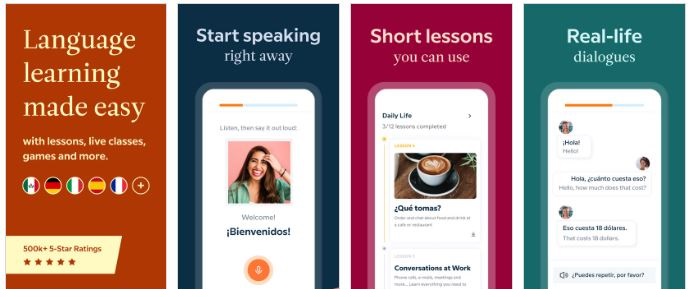
When I started my journey of learning the language, I started with Babbel. The app has short but step-by-step lessons that help you gain a foothold.
According to me, Babbel’s key strength is improving your spoken language. It ensures that you are pronouncing words the right way.
There are games and lessons that feature audio notes where you can hear how the native speakers pronounce words.
Accents and tones are very important when speaking German as often the same word can be pronounced in two different ways and have two different meanings.
Key Features
- Lessons based on daily practical life
- Practice texting in German with a chatbot
- Live classes
- Games and quizzes keep things interactive
- Set your own schedules and reminders
2. Best Runner Up: Duolingo
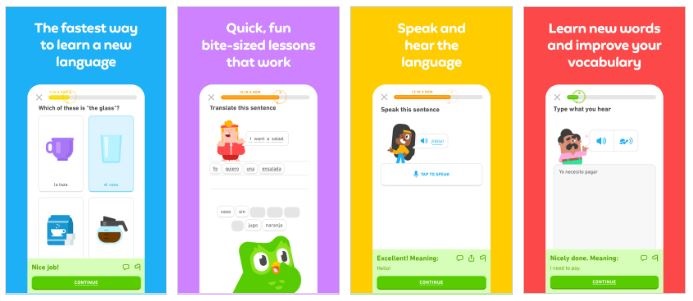
Duolingo is extremely popular and satisfying. What I really love about this app is the fact that I don’t really have to sit through traditional “lessons” here.
The app makes use of basic flashcards and helps you learn in a very intuitive manner. It drops one learning session every day and rewards you with a ‘streak’ that you can build.
I love this streak feature because it keeps us motivated. It also gives you social media bragging rights. Duolingo is also great if you want to learn new words and build your German vocabulary every day.
Key Features
- Daily lessons
- Games and characters make learning fun
- Tests and quizzes track your progress
- Lessons created by language learning experts
- Listen to natives and pronounce words correctly
3. Best with Audio/Video Lessons: Innovative Language Learning
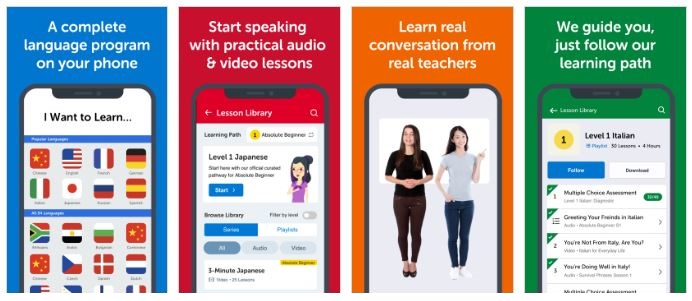
The Innovative Language Learning app helps you speak German with the help of audio and video lessons.
What makes this app a part of this list is the fact that there are actual teachers out there who are teaching you how to speak. It keeps testing you from time to time and you are also given assignments.
There is also a space to interact with your teacher. Premium users can learn one-on-one with their teachers. Lastly, I love the fact that this app syncs progress across devices, including Apple TV.
Key Features
- German teachers to help you one-on-one
- Lots of tests and assignments
- Daily lessons to build your vocabulary
- Supports Apple TV
4. Best Interactive App: Rocket Languages
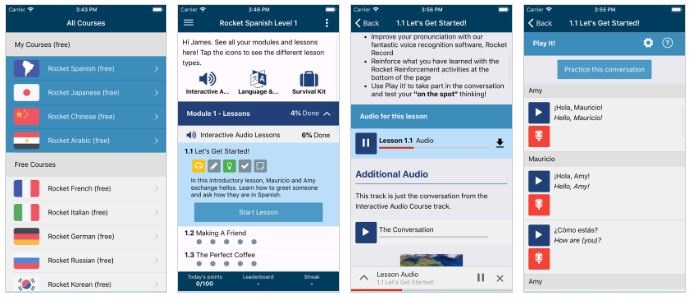
What if your textbooks were interactive? That’s exactly what the Rocket Languages app does. It teaches German to you in a very textbook manner, but it also has a lot of interactive elements.
Audio notes on this app help you pronounce German words the right way. One of my favorite features here is the ability to create a playlist of phrases and listen to them while I’m doing other activities.
While I’m not the biggest fan of this app’s UI, it makes for a great supplementary German language app to use with my main one (Babbel or Duolingo).
Key Features
- Learn at your own pace and schedule
- The testing algorithm helps you remember better
- Create playlists of phrases
- The app also gives you cultural tips
- Features over 60 hours of audio lessons
5. Best with Games: Drops
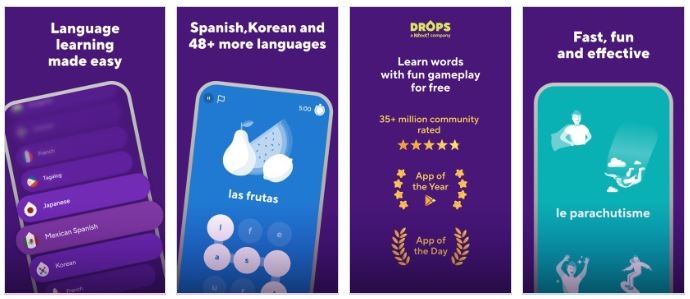
Drops is an app that aims at making language learning fun. The app makes use of games and other interactive elements such as quizzes and flashcards to achieve that. I am a big fan of the illustrations that the app uses to teach language.
I find this visual mode of learning much better than traditional instruction-based language learning. They also have a vocab list of over 3000 words and phrases.
The app has truly been gamified because you get rewards as you level up in your German-learning journey.
Key Features
- Games and quizzes
- Detailed list of vocabulary and phrases
- Professional voice artists ensure the right pronunciations
- Rewards after completing every level
- Teaches over 50 different languages including Korean, Arabic, French, Italian, Tagalog, and Vietnamese.
6. Best for Practice: Mango Languages Learning
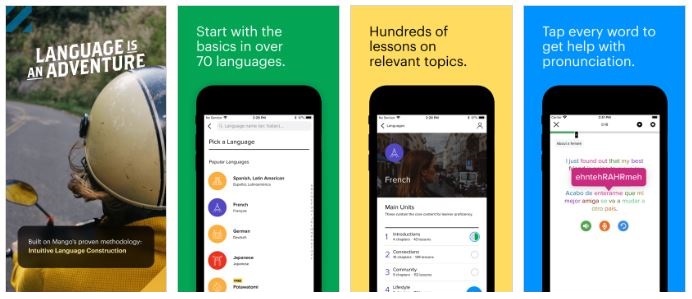
Mango is a great language-learning app for those who are just beginning with the German language. I like to use it as my secondary app along with Babbel, but it can also do well as a primary app.
My favorite feature in Mango is the one that matches my voice to that of a speaker, so I know which alphabet I need to stress more on.
The app has pronunciations for every word on the screen, which is of great help. There are a lot of tests and practice questions, which ensure that you retain what you learn.
Key Features
- Focuses on practical conversations
- Audio notes recorded by native German speakers
- Practice your speaking skills by matching voice
- Tests to ensure you learn better
- Learn over 70 languages using Mango
7. Best Content Library: LingQ
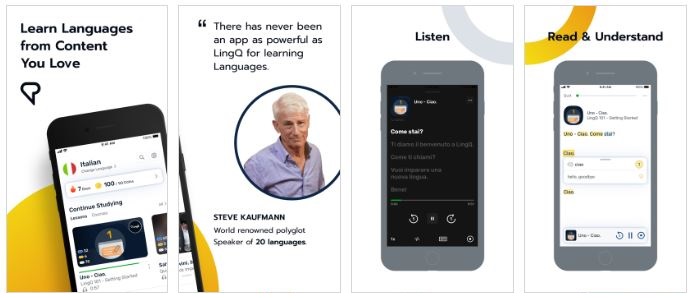
LingQ is a good German language learning software with real-world examples such as news articles, books, and blogs.
There are many audio and text-based lessons as well, but when you combine them with real-world use cases, it helps reinforce the learning.
The app also has podcasts and audiobooks that will help improve your German. Furthermore, I love that you can actually download all the audio along with the transcripts to learn better.
The app has frequent tests and quizzes which keep your progress in check. All in all, a pretty good app for learning German.
Key Features
- Built by an expert community of language learners
- All audio content is downloadable
- Audiobooks and podcasts to keep you engaged
- Learn using real-world material
- Measure your German learning progress
8. Best for Kids: LingoDeer
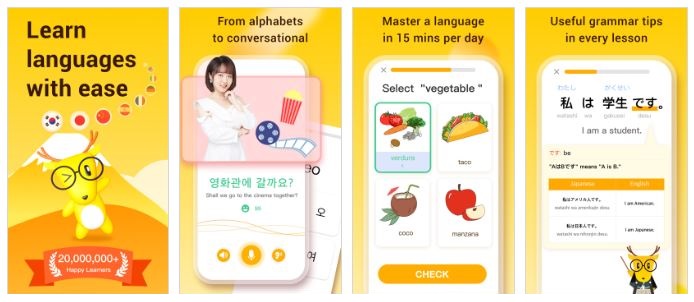
LingoDeer helps you learn German by giving you 15-minute lessons every day. The lessons are all interactive and game-like, which keeps it fun.
Besides improving your vocabulary and teaching you phrases, these lessons also have a special focus on grammar.
My personal favorite here is the chatbot which helps you practice conversations and ensures you get your grammar right. There’s also a quick-access phrasebook here which you can use for essential phrases.
Key Features
- 15-minute lessons every day
- Lots of games, quizzes, and flashcards
- Structured lessons that help you progress
- Stats that indicate your progress over time
- Chatbot to practice German conversations
9. Best for Grammar: Falou
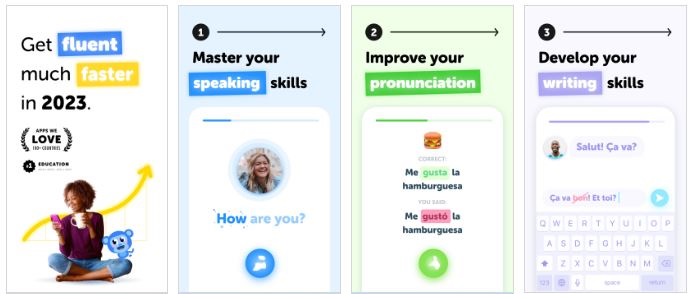
I am a big fan of the minimalist UI that Falou adapts. The app doesn’t really make it to the primary apps list for me but is my favorite secondary app to use along with Babbel or Duolingo.
This is my favorite German app when it comes to enhancing speaking skills and pronunciation. It also has a special section for writing where grammar is the key focus.
The app also provides certificates as you advance in your language-learning journey. Falou teaches 25 other languages other than German as well.
Key Features
- Minimalist UI, very easy to navigate
- Focuses on writing and speaking German
- Lessons created by native speakers
- Provides certificates as you advance
- Learn 26 different languages using Falou
10. Lingvist
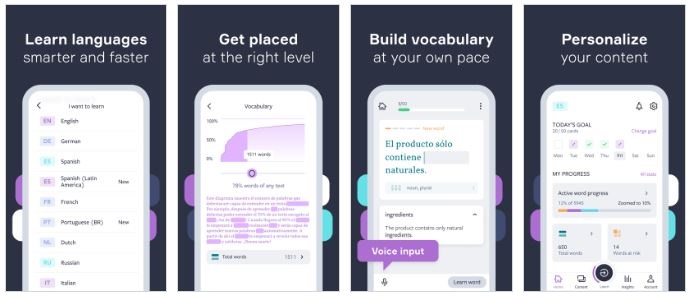
Lingvist is an app that helps you smartly learn German. The app allows you to build on your vocabulary and personalizes its lessons based on your needs.
This ability to create your own lessons is my favorite feature of this app. There is a very detailed list of vocabulary and phrases here, which have words for every situation.
It also comes with a hands-free mode where you can let your playlist flow while you do other stuff.
Key Features
- Create your own language-learning syllabus
- Lots of words and phrases to learn from
- Clean UI and easy-to-use app
- Detailed stats of your German learning progress
- Hands-free mode to listen to lessons
Frequently Asked Questions
Not really. It’s much easier than learning Greek. The reason is that it’s a category 2 language as per FSI. Around 40% of the vocabulary is similar to English. So, for English speakers, it’s going to be a lot easier.
The German language can take up to 30 weeks to learn, but achieving fluency and proficiency may require around 6 to 8 months. I recommend using a combination of 2 or 3 apps at the same time. Apps like Falou and Lingodeer go well with Duolingo.
Wrap Up!
I used to think languages could only be learned when young or in school, but these apps proved me wrong. German engineering, beverages, education systems, and automobiles are considered among the best globally.
I hope this list helps you master the German language.


I think this is among the most significant info for
me. And i’m glad reading your article. But want to remark on some general things, The website
style is wonderful, the articles is really great : D.
Good job, cheers